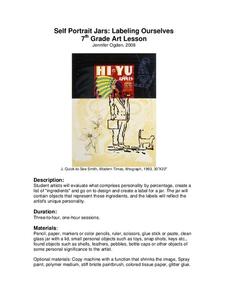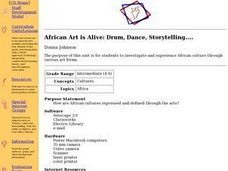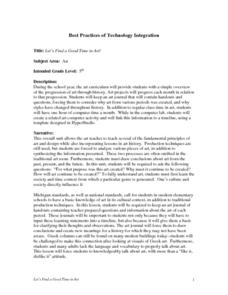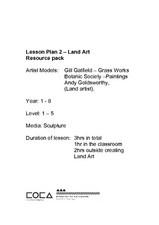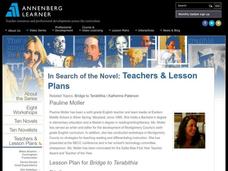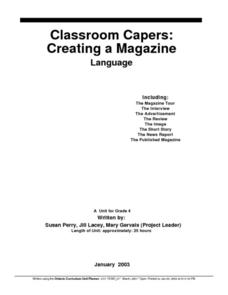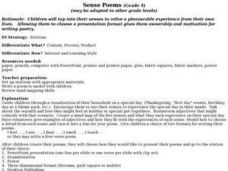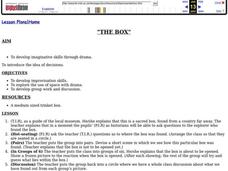Curated OER
Clay Gargoyles and Grotesques
Grotesques or gargoyles are wonderful subjects for stories or art projects. Here is a simple "how to" for creating a lesson about sculpting clay gargoyles. Tip: Have learners research gargoyles throughout history.
Curated OER
Language Arts: Cocaine in a Can
Students examine the case of "Cocaine," a new soft drink targeted at teens. They explore the decision by some stores not to sell it. Students compose essays expressing their views about the drink and the ensuing decisions.
Curated OER
Women
A close study of two works of art provides the introduction to this cross-curricular writing assignment. After comparing the clothing, facial expressions, body language, setting, and color in the two 19th century paintings Tissout’s...
Curated OER
Medieval Art
Sixth graders study Gothic architecture on the Internet and create a mug with a gargoyle figure on it.
Georgia Career, Technical, and Agricultural Education
World of Fashion — Vocabulary Worksheet
Make sure your fashionistas know how to talk about all the latest and oldest styles. Partners work together to define 18 fashion-related terms, ranging from style to home furnishings. Definitions are included on the second page of the...
Curated OER
Story Telling with Black & White Photography
4th-8th graders will explore Wright Morris' photography and create their own black and white photographs. They will then use the photographs to portray a message they want communicated by writing a narrative telling a story about the...
Curated OER
The Amazing Maud Lewis
Students investigate cultural art from Canada by reading about Maud Lewis. In this Canadian history lesson, students identify the work of Lewis by visiting her magazine website. Students identify other heroes in Nova Scotia...
Curated OER
Self Portrait Jars: Labeling Ourselves
Seventh graders create an alternative self-portrait. In this art lesson students study the artwork of Jaune Quick-to-See Smith. Students use her work as inspiration for a self-portrait in a jar form.
Curated OER
Swirling, Twirling, Glistening Jewels... Glass Art In Words
Students examine the art form of the glass sculpture. After viewing a three dimensional object, they write creatively describing the object through the use of metaphors. They use peer editing to check for grammatical and spelling errors.
Curated OER
African Art is Alive: Drum, Dance, Storytelling....
Students investigate and experience African culture through various art forms. Students explore the physical and political geographies of Africa through mapping activities. Students, in groups, prepare presentations about different...
Curated OER
Let's Find a Good Time in Art!
Fifth graders make a Hyperstudio presentation based on their study of different time periods in art history. They complete a timeline using a teacher made template to complete the project.
Curated OER
Scratch Art
Students create a piece of art using crayons, black paint and toothpicks. They cover a paper with bright crayon color, paint over the crayons with black paint and then scratch a design over the black paint in a an outline of their choice.
Curated OER
Land Art
Students use natural materials outside to create a work of art. In this land art lesson plan, students plan their sculpture inside in one day and create it outside over a period of 2 days.
Curated OER
Bridge to Terabithia
Students explore scenes from Katherine Paterson's book, Bridge to Terabithia. In this visualization lesson plan, students listen to the story read aloud. The students then choose words and phrases that paint a picture in their heads....
Curated OER
What Makes the Writer Write
Your 11th and 12th graders are ready to critique society! Channel that inclination by studying a novel that offers social criticism of other eras (book recommendations included). This resource presents a well-thought-out overview of such...
Curated OER
Classroom Capers: Creating a Magazine
Fourth graders build language skills in the context of creating a classroom magzine. They participate in activities which help students communitcate ideas and information for a variety of purposes and for specific audiences using the...
Curated OER
Sense Poems
Students explore 5 senses poetry. In this poetry writing lesson, students visualize a special day and brainstorm related vivid adjectives and phrases. Students create mindmaps of the five senses to go with their visualization...
Curated OER
What a Character!
Guide your readers to explore character traits. As a class, discuss and record the traits of a commonly-known fairy tale character. Then do the same with the main character in the class novel. Finally, have learners use magazines...
Curated OER
Global Warming: Writing and Editing a Research Report
Bring environmental issues into your classroom! Practice writing and peer editing research reports on global warming and the greenhouse effect. Middle schoolers can work on their research skills, their writing skills, and how to...
Curated OER
Leonardo da Vinci: Artist, Scientist, Inventor
Students explore the connection of art, science, and history during the Renaissance Period. In this art instructional activity, students watch a PowerPoint presentation with examples of da Vinci's work. To finish this instructional...
Curated OER
The Box
Learners of any age can participate in this imagination and improve development activity. With the use of a small box, they work through a series of questions or situations posed by the teacher. Each group uses the box to create short...
Curated OER
The Sorcerer's Apprentice: 200 Greatest Pop Culture Icons
Upper graders view the animated short, "The Sorcerer's Apprentice" and analyze how the music score was chosen to express the scene. They create an animation as they listen to a classical recording to experience the connection between...
Curated OER
Paintings on the Ceiling
Students explore the graffiti paintings of Paco Rosic and recognize that his artworks were designed to please himself. Your class are led to identify the techniques in Paco Rosic's paintings and create graffiti art. There...
Curated OER
Mississippi Trial, 1955: A Request Strategy for Questioning
Knowledge, comprehension, application, analysis, synthesis, evaluation. Class members use Bloom's taxonomy to craft six levels of discussion questions for Chris Crowe's novel, Mississippi Trial, 1955. Model questions from Chapter 3, a...









